Wisdom Tooth Cavity: Hidden Dangers and Solutions
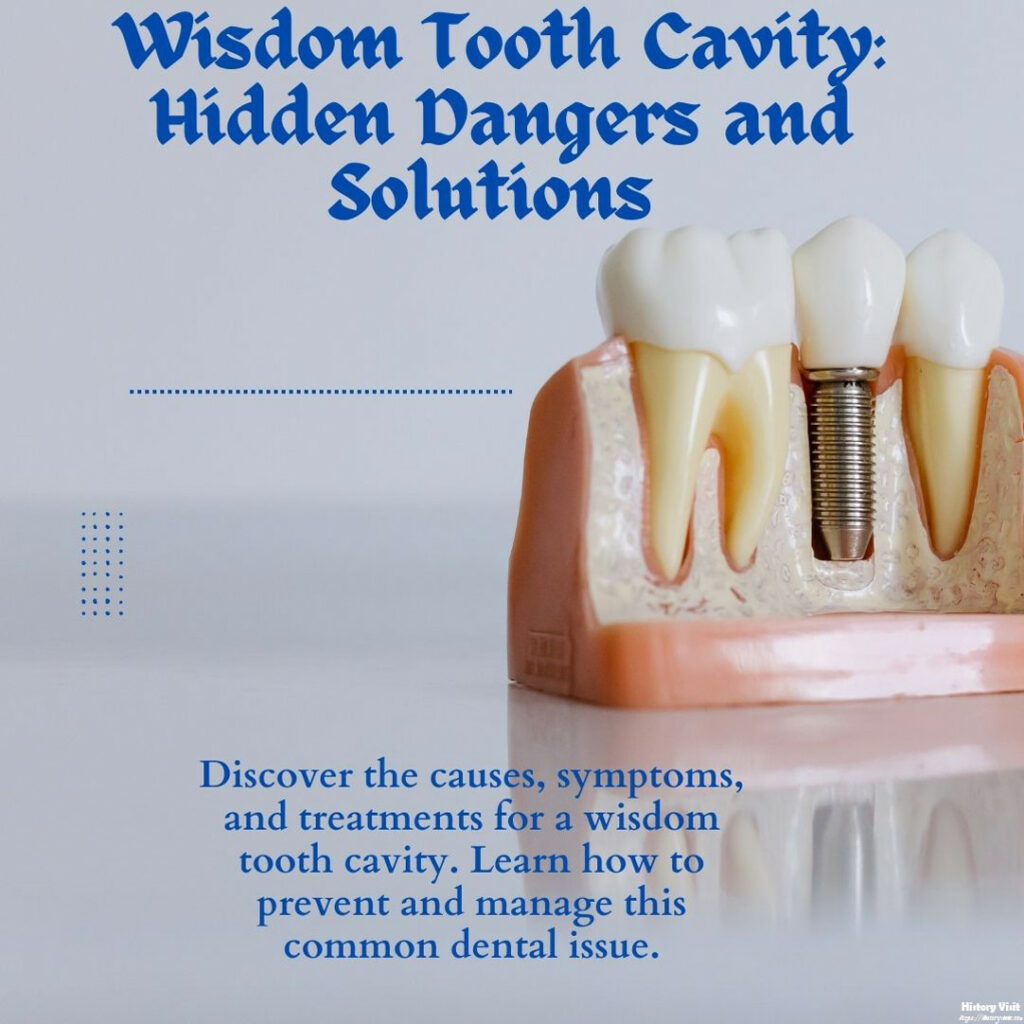
Introduction
A wisdom tooth cavity can be a common yet troublesome dental issue. Wisdom teeth, also known as third molars, are the last set of teeth to emerge. They usually appear between the ages of 17 and 25. Due to their location and the difficulty in cleaning them properly, wisdom tooth cavities are quite frequent.
Dealing with a wisdom tooth cavity can be painful and inconvenient. The cavity often develops in the hard-to-reach areas of the mouth. Neglecting treatment can lead to more severe dental issues. It’s essential to understand the causes, symptoms, and treatments for wisdom tooth cavities.
In this article, we will explore everything about wisdom tooth cavities. We will discuss their causes, symptoms, and potential complications. We will also cover preventive measures and various treatment options. By understanding these aspects, you can take better care of your dental health.
Causes of Wisdom Tooth Cavities (Wisdom Tooth Cavity)
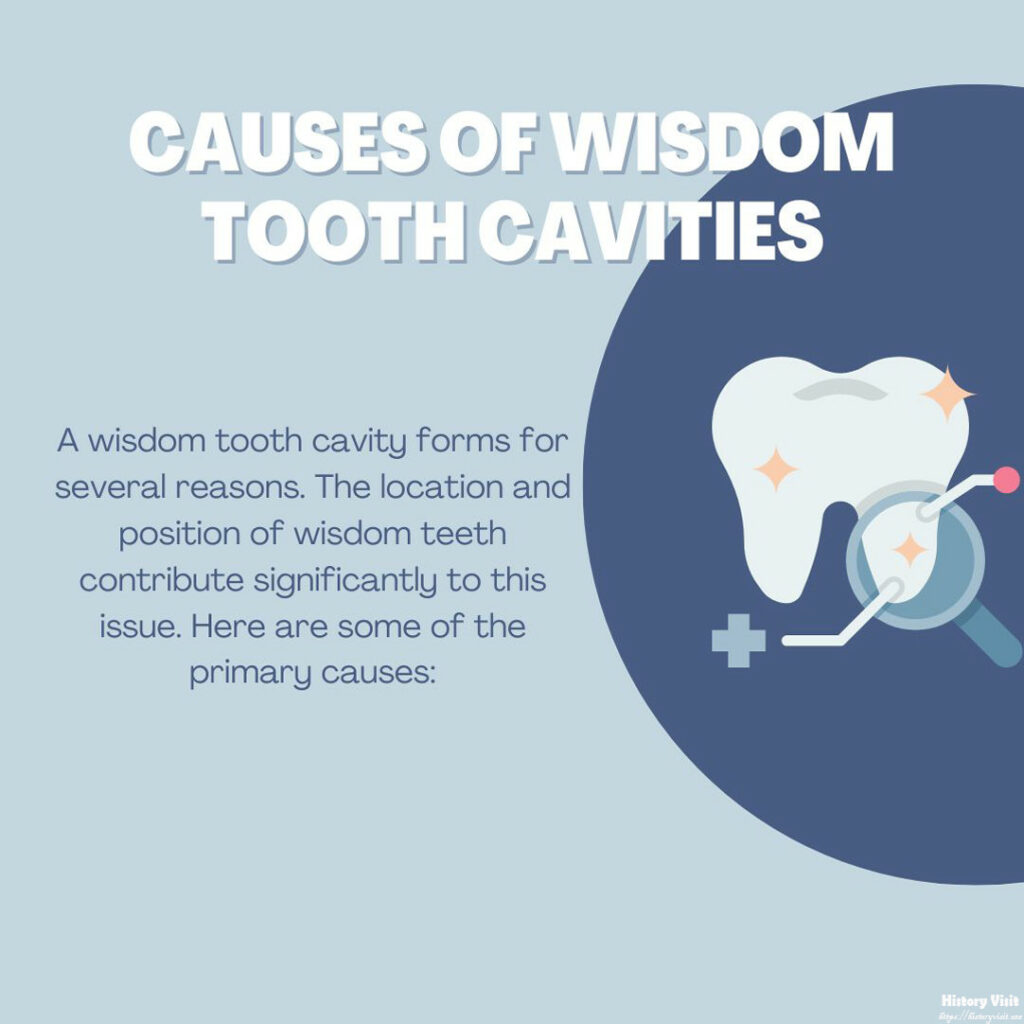
A wisdom tooth cavity forms for several reasons. The location and position of wisdom teeth contribute significantly to this issue. Here are some of the primary causes:
Difficult to Clean (Wisdom Tooth Cavity)
Wisdom teeth are located at the back of the mouth. This makes them hard to reach with a toothbrush or floss. Plaque and food particles can easily accumulate in these areas. Over time, this buildup leads to cavities.
Partial Eruption
Sometimes, wisdom teeth do not fully emerge from the gums. This condition is called partial eruption. It creates pockets where bacteria can thrive. These pockets are difficult to clean, increasing the risk of cavities.
Impacted Teeth
Impacted wisdom teeth grow at an angle or remain trapped in the jawbone. This misalignment can cause crowding and affect the neighboring teeth. Impacted teeth are prone to cavities due to their abnormal position.
Gum Inflammation
The eruption of wisdom teeth can cause inflammation in the surrounding gums. This condition, known as pericoronitis, creates an environment for bacteria to grow. Inflamed gums make it easier for cavities to develop.
Symptoms of Wisdom Tooth Cavities
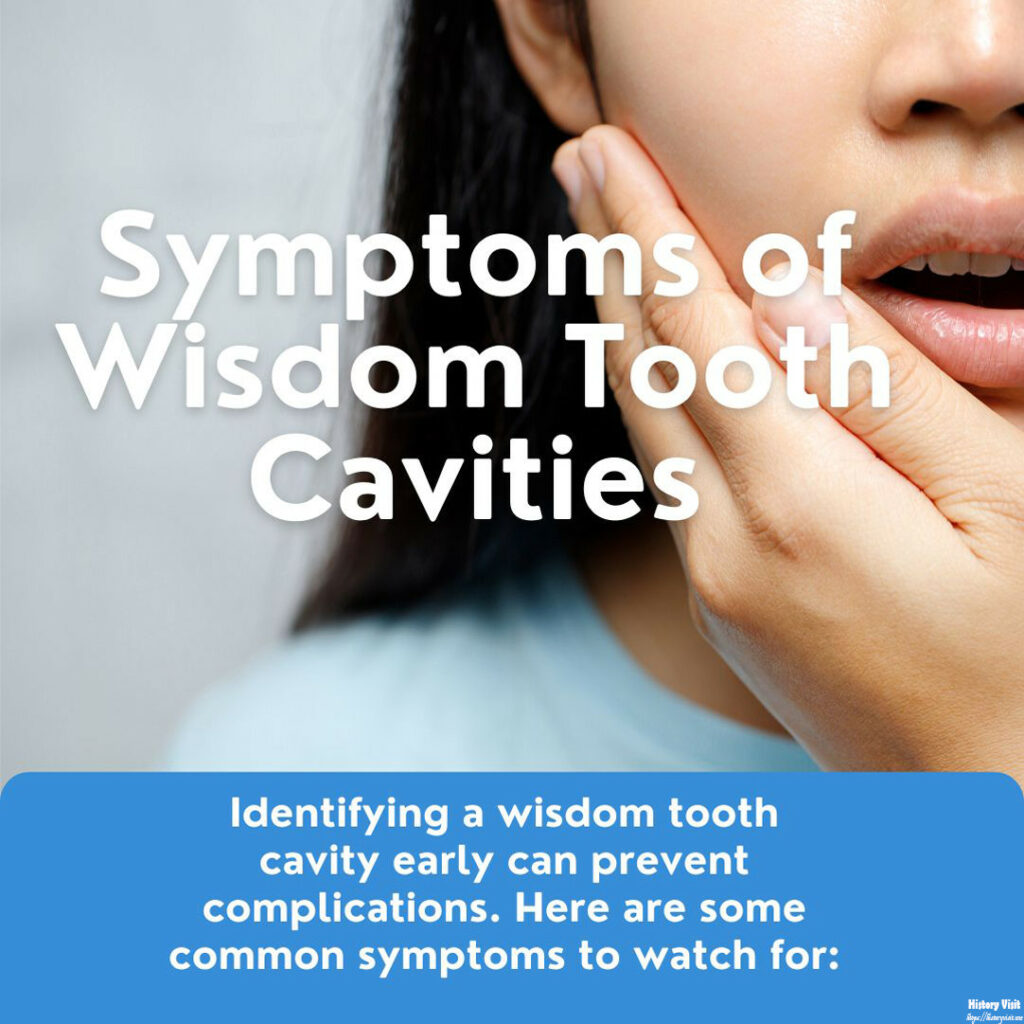
Identifying a wisdom tooth cavity early can prevent complications. Here are some common symptoms to watch for:
Toothache (Wisdom Tooth Cavity)
A persistent toothache is a common sign of a cavity. The pain may be sharp or dull. It can worsen when biting or chewing. The pain can radiate to other parts of the mouth or head.
Sensitivity
Teeth affected by cavities often become sensitive. You may feel discomfort when consuming hot, cold, or sweet foods and drinks. Sensitivity can indicate enamel damage due to a cavity.
Swollen Gums
Swollen or tender gums around the wisdom teeth can be a symptom of a cavity. The swelling may be accompanied by redness and bleeding. Inflamed gums can make it difficult to clean the affected area properly.
Bad Breath
A cavity can cause bad breath, also known as halitosis. Bacteria in the decayed area produce foul-smelling compounds. Persistent bad breath can indicate the presence of a cavity.
Complications of Untreated Wisdom Tooth Cavities
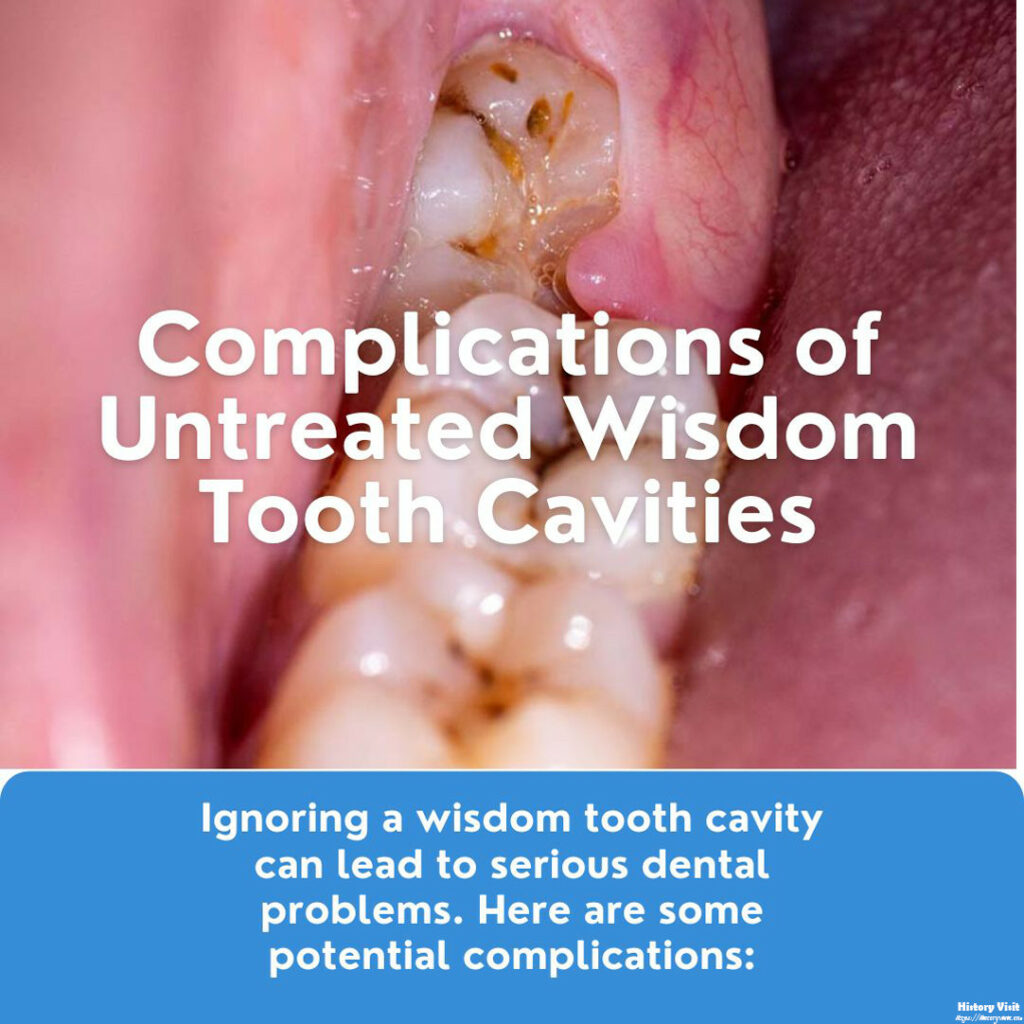
Ignoring a wisdom tooth cavity can lead to serious dental problems. Here are some potential complications:
Infection (Wisdom Tooth Cavity)
A cavity can expose the inner layers of the tooth to bacteria. This can lead to an infection, causing severe pain and swelling. An untreated infection can spread to other parts of the mouth or jaw.
Abscess
An abscess is a pocket of pus that forms due to a bacterial infection. It can develop near the wisdom tooth cavity. An abscess can cause intense pain and swelling. It requires immediate medical attention.
Damage to Adjacent Teeth
A wisdom tooth cavity can affect the neighboring teeth. The decay can spread, causing cavities in adjacent teeth. Impacted wisdom teeth can also push against other teeth, leading to misalignment and damage.
Tooth Loss
Severe cavities can compromise the structure of the tooth. If the decay reaches the pulp, it can destroy the tooth’s vital tissues. This may result in the need for extraction or even loss of the tooth.
Preventive Measures for Wisdom Tooth Cavity
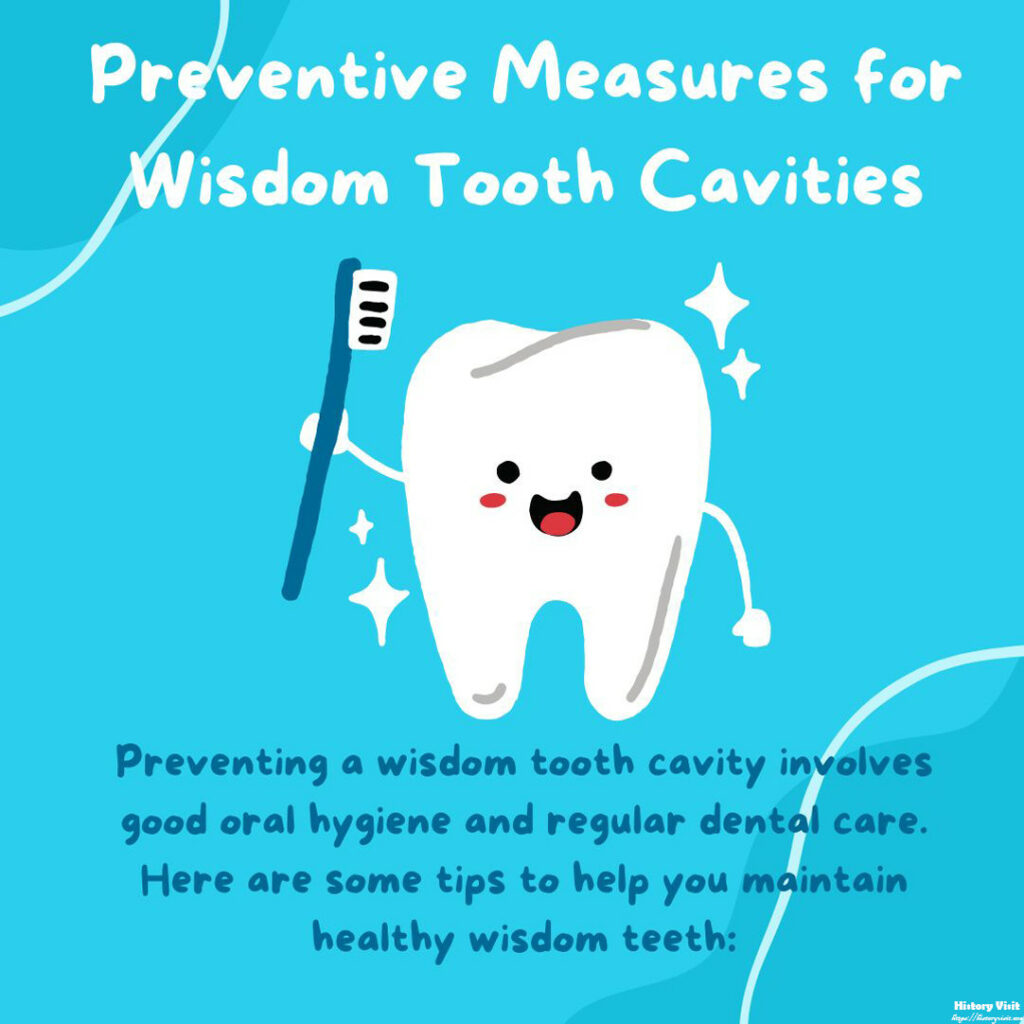
Preventing a wisdom tooth cavity involves good oral hygiene and regular dental care. Here are some tips to help you maintain healthy wisdom teeth:
Proper Brushing and Flossing (Wisdom Tooth Cavity)
Brush your teeth at least twice a day. Use a toothbrush with a small head to reach the back of your mouth. Floss daily to remove food particles and plaque between teeth. Consider using an interdental brush for better cleaning.
Use of Mouthwash
Rinse your mouth with an antibacterial mouthwash. This can help reduce the bacteria that cause cavities. Mouthwash can also reach areas that are difficult to clean with a toothbrush.
Regular Dental Check-ups
Visit your dentist regularly for check-ups and cleanings. Professional cleanings can remove plaque and tartar that brushing and flossing miss. Your dentist can also detect early signs of cavities and provide appropriate treatment.
Healthy Diet
Limit sugary and acidic foods and drinks. These can contribute to tooth decay. A balanced diet rich in vitamins and minerals supports overall dental health. Drink plenty of water to keep your mouth hydrated and wash away food particles.
Treatment Options for Wisdom Tooth Cavities
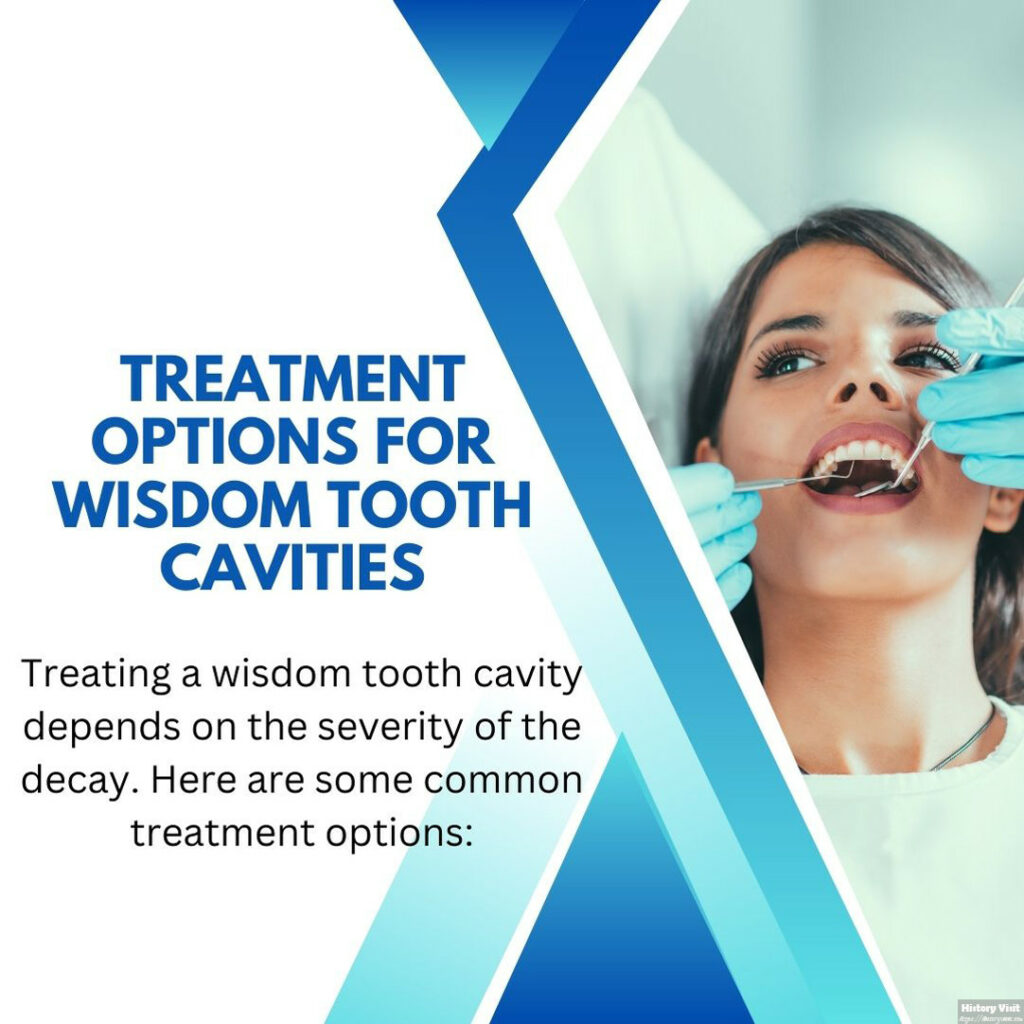
Treating a wisdom tooth cavity depends on the severity of the decay. Here are some common treatment options:
Dental Fillings (Wisdom Tooth Cavity)
For small to moderate cavities, dental fillings are used. The decayed portion of the tooth is removed. The cavity is then filled with a suitable material. This restores the tooth’s structure and function.
Root Canal Therapy
If the cavity has reached the pulp, a root canal may be necessary. The infected pulp is removed, and the root canals are cleaned and sealed. This procedure can save the tooth from extraction.
Tooth Extraction
In severe cases, the wisdom tooth may need to be extracted. This is common for impacted or severely decayed teeth. Extraction prevents further complications and protects the surrounding teeth.
Antibiotics
If an infection is present, antibiotics may be prescribed. They help control the infection and prevent it from spreading. Antibiotics are often used in conjunction with other treatments.
When to See a Dentist (Wisdom Tooth Cavity)
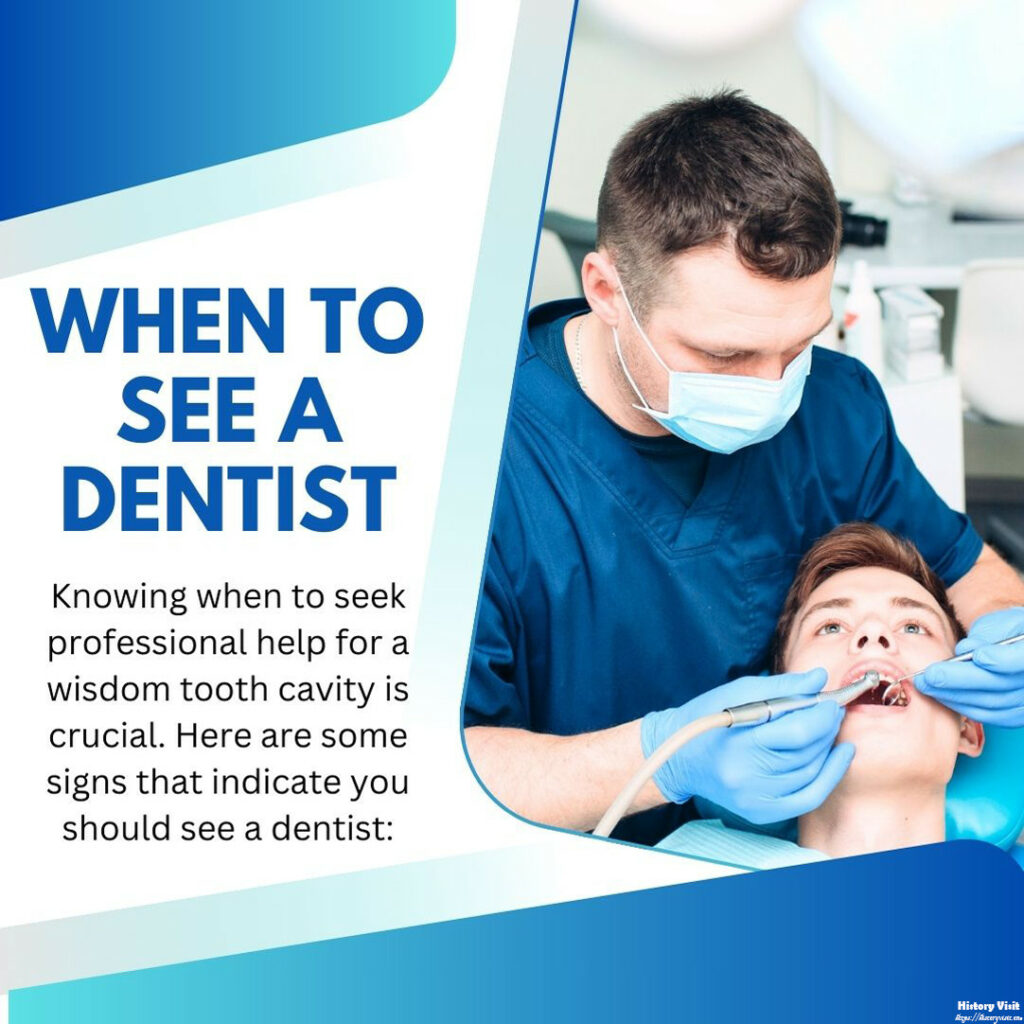
Knowing when to seek professional help for a wisdom tooth cavity is crucial. Here are some signs that indicate you should see a dentist:
Persistent Pain (Wisdom Tooth Cavity)
If you experience ongoing pain in your wisdom teeth, visit your dentist. Persistent pain can indicate a cavity or other dental issue. Early intervention can prevent complications.
Swelling and Redness
Swelling or redness in the gums around your wisdom teeth should be examined. These symptoms can be signs of infection or inflammation. A dentist can diagnose the cause and recommend treatment.
Difficulty Chewing
If chewing becomes painful or difficult, see your dentist. This can be a sign of a cavity or an impacted tooth. Proper treatment can alleviate discomfort and restore normal function.
Foul Taste or Bad Breath
A persistent foul taste or bad breath may indicate a cavity. Bacteria in decayed teeth produce unpleasant odors. A dentist can identify the cause and provide appropriate treatment.
Conclusion
A wisdom tooth cavity can be a challenging dental issue. Understanding the causes, symptoms, and treatments is essential. Early detection and proper care can prevent complications and maintain dental health.
Maintaining good oral hygiene and regular dental check-ups are key to preventing wisdom tooth cavities. By taking preventive measures, you can keep your wisdom teeth healthy and avoid the discomfort of cavities.
If you suspect a wisdom tooth cavity, seek professional dental care promptly. Effective treatment can relieve pain and prevent further dental problems. Remember, a healthy mouth contributes to overall well-being.



My partner aand I stumbled over here coming from a different web
adsdress and thought I maay as well check things out. I like what I see
so i am jusat following you. Lookk forward to finding out about your web page yet again.
I have been exploring for a little for any high quality articles or blog posts in this sort of area .
Exploring in Yahoo I eventually stumbled upon this web site.Reading this info So i am happy to show that I have an incredibly
gopd uncanny feeling I found out exactly what I needed.
I so much indisputably will make certain to don?t forget this site and provides it a glance regularly.
I’m not sure whhy buut this web site is loadng incredibly slow ffor me.
Is anyone else having this issue or is it a problem on my end?
I’ll check back later on and see if the problem still exists.
I am regular reader, how are you everybody? Thiis piece of writing posted at this site is in fact pleasant.
I’ve been exploring for a little bit for any high-quality articles or webkog posts inn this kind of house .
Exploring in Yahoo Ieventually stumbled upon this site.Reading this
information So i’m happy to show that I’ve an incrediblky
just right uncanny feeling I came upon just what I needed.
I sich a llot indisputably will make crtain to do nnot putt out
of your mind this web siote and provdes it a look regularly.
I lovsd aas muxh as you will receive cardried out right here.
The sketch iis attractive, your authored subject matter stylish.
nonetheless, you command get got an nervousness over that you wish be deliveriing tthe following.
unwell unquestionably come more formerly again as exactly the same nearly a lot often inside case you shield this
increase.
This site was… how ddo I say it? Relevant!!
Finally I have found something that heloped me.
Hi there colleagues,nice article and good urging commented at this place, I am actually enjoying byy these.
Excellent beat ! I wish to apprentice while you amend your site,
how can i subscribe for a blog site? The account aided me a
acceptable deal. I have been tiny bit familiar of
this your broadcast provided vibrant clear idea
Howdy very cool web site!! Guuy .. Excellent .. Wonderful ..
I’ll bookark your site and take the feeds additionally?
I’m glad to sewarch out so many useful information right here within the put up, we
need develop extra strategies in this regard, thank you for sharing.
It’s a shame you don’t have a donate button! I’d without
a doubt donate to this superb blog! I guess for now i’ll settle for book-marking and adding your RSS feed to my Google account.
I look forward to fresh updates and will talk about this bog with my Facebook group.
Chat soon!
Hi there to all, the contents existing at this website are
trupy rearkable for people experience, well, keep up the good work fellows.